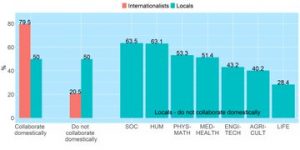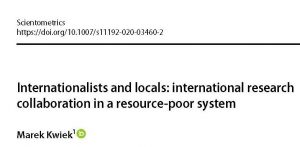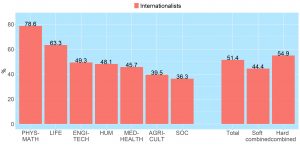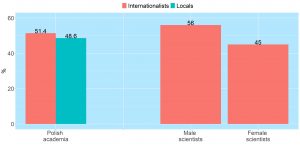Marek Kwiek published another article in „Scientometrics”.
The article is about a distiction between „internationalists” and „locals” in research – contrasting scientists collaborating and not collaborating internationally.
Marek Kwiek, „Internationalists and locals: international research collaboration in a resource-poor system”
Published on-line April 28, 2020.
Scientometrics (2020). https://doi.org/10.1007/s11192-020-03460-2
The article is available from Scientometrics website (Gold Access) or ![]() here.
here.
Abstract
The principal distinction drawn in this study is between research “internationalists” and “locals.” The former are scientists involved in international research collaboration while the latter group are not. These two distinct types of scientist compete for academic prestige, research funding, and international recognition. International research collaboration proves to be a powerful stratifying force, involving two parallel processes: “internationalization accumulative advantage” and “internationalization accumulative disadvantage.” As a clearly defined subgroup, internationalists are a different academic species, accounting for 51.4% of Polish scientists; predominantly male and older, they have longer academic experience and higher academic degrees and occupy higher academic positions. Across all academic clusters, internationalists consistently produce more than 90% of internationally co-authored publications, representing 2,320% of locals’ productivity for peer-reviewed articles and 1,600% for peer-reviewed article equivalents. Internationalists tend to spend less time than locals on teaching-related activities, more time on research, and more time on administrative duties. Based on a large-scale academic survey (N = 3,704), some new predictors of international research collaboration were identified by multivariate analyses. The findings have global policy implications for resource-poor science systems “playing catch-up” in terms of academic careers, productivity patterns, and research internationalization policies.


References
Abramo, G., C. A. D’Angelo, M. Solazzi (2011a). The Relationship between Scientists’ Research Performance and the Degree of Internationalization of Their Research. Scientometrics. 86. 629-643.
Abramo, G., C. A. D’Angelo, M. Solazzi (2011b). Are researchers that collaborate more at the international level top performers? An investigation on the Italian university system. Journal of Informetrics. 5: 204-213.
Abramo, G., C. A. D’Angelo, G. Murgia (2013). Gender Differences in Research Collaboration. Journal of Informetrics.7: 811-822.
Abramo, G., D’Angelo, C.A., Di Costa, F. (2019). A gender analysis of top scientists’ collaboration behavior: evidence from Italy. Scientometrics. Published online: 30 May 2019.
Abramo, G., C. A. D’Angelo, G. Murgia (2013). Gender Differences in Research Collaboration. Journal of Informetrics.7: 811-822.
Abramo, G., D’Angelo, C. A., & Murgia, G. (2014). Variation in Research Collaboration Patterns across Academic Ranks. Scientometrics, 98(3), 2275–2294.
Abramo, G., D’Angelo, C.A., Di Costa, F. (2018). The collaboration behavior of top scientists. Scientometrics. On-line first: 29 November 2018.
Abramo, G., C. A. D’Angelo, Murgia, G. (2016). The combined effect of age and seniority on research performance of full professors. Science and Public Policy. 43(3): 301–319.
Ackers, L. (2008). Internationalization, mobility and metrics: A new form of indirect discrimination? Minerva 46: 411-435.
Aksnes, D.W., Piro, F.N., Rørstad, K. (2019). Gender gaps in international research collaboration: a bibliometric approach. Scientometrics. Published online: 13 June 2019.
Antonowicz, D. (2016). Digital players in an analogue world: Higher education in Poland in the post-massification era. In B. Jongbloed & H. Vossensteyn (Eds.), Access and expansion post-massification. Opportunities and barriers to further growth in higher education participation (pp. 63–81). London: Routledge.
Antonowicz, D., Kwiek, M., & Westerheijden, D. F. (2017). The government response to the private sector expansion in Poland. In H. de Boer, J. File, J. Huisman, M. Seeber, M. Vukasovic, & D. F. Westerheijden (Eds.), Policy analysis of structural reforms in higher education (pp. 119–138). Dordrecht: Springer.
Beaver, D. D. (2001). Reflections on scientific collaboration (and its study): past, present, and future. Scientometrics. 52(3): 365-377.
Bentley, P. J. (2015). Cross-country differences in publishing productivity of academics in research universities. Scientometrics, 102(1), 865–883.
Bieliński, J. & Tomczyńska, A. (2018). The Ethos of Science in Contemporary Poland. Minerva. On-line first: https://link.springer.com/article/10.1007/s11024-018-9365-1.
Bonaccorsi, A., Daraio, C. (2003). Age effects in scientific productivity. The case of the Italian National Research Council (CNR). Scientometrics. 58(1): 49-90.
Bozeman, B, Boardman, C. (2014). Research Collaboration and Team Science. A State-of-the-Art Review and Agenda. Cham: Springer.
Bryman, A. (2012). Social Research Methods. 4th Edition. Oxford: Oxford University Press.
Carvalho, T. (2017). The study of the academic profession – contributions from and to the sociology of professions. In: Huisman, J. and M. Tight (Eds.), Theory and method in higher education research. Bingley, UK: Emerald Group Publishing Limited, First edition, 59–76.
Cohen, L., Manion, L., & Morrison, K. (2011). Research methods in education. New York: Routledge.
Cole, J. R., & Cole, S. (1973). Social stratification in science. Chicago: University of Chicago Press.
Costas, R., van Leeuwen, T.N, Bordons, M. (2010). A Bibliometric Classificatory Approach for the Study and Assessment of Research Performance at the Individual Level: the Effects of Age on Productivity and Impact. Journal of the Am. Society for Information Science and Technology. 61(8): 1564-1581.
Cummings, W.K., Finkelstein, M.J. (2012). Scholars in the Changing American Academy. Dordrecht: Springer.
Cummings, J.N., Kiesler, S. (2007). Coordination costs and project outcomes in multi-university collaborations. Research Policy. 36: 1620-1634.
Dakowska, D. (2015). Between competition imperative and Europeanisaton: the case of higher education reform in Poland. Higher Education. 69(1): 129–141.
Finkelstein, M. & Sethi, W. (2014). Patterns of Faculty Internationalization: A Predictive Model. In: F. Huang, M. Finkelstein & M. Rostan (Eds.), The Internationalization of the Academy. Changes, Realities and Prospects. Dordrecht: Springer. 237-258.
Finkelstein, M.J., Walker, E., & Chen, R. (2013). The American faculty in an age of globalization: predictors of internationalization of research content and professional networks. Higher Education. 66: 325-340.
Fox, M. F. (1992). Research, teaching, and publication productivity. Mutuality versus competition in academia. Sociology of Education, 65(4), 293–305.
Fox, M.F., Realff, M.L., Rueda, D.R., & Morn, J. (2017). “International Research Collaboration Among Women Engineers: Frequency and Perceived Barriers, by Regions”. Journal of Technology Transfer. 42(6): 1292-1306.
Gazni, A, Sugimoto, C.R, and Didegah, F. (2012). “Mapping World Scientific Collaboration: Authors, Institutions, and Countries”. Journal of the American Society for Information Science and Technology. 63(2): 323-335.
Georghiou, L. (1998). Global cooperation in research. Research Policy. 27: 611-628.
Glenn, N.D. (2005). Cohort Analysis. Thousand Oaks: Sage.
Godin, B. & Gingras, Y. (2000). Impact of Collaborative Research on Academic Science. Science and Public Policy. 27(1). 65-73.
Gorelova, O., & Lovakov, A. (2016). Academic Inbreeding and Research Productivity of Russian Faculty Members. Working Papers. WP BRP 32/EDU/2016.
Gouldner, A. (1957). Cosmopolitans and Locals: Toward an Analysis of Latent Social Rules. Administrative Science Quarterly. 2. 281-306.
Guldbrandsen, M., & Smeby, J.-C. (2005). Industry funding and university professors’ research performance. Research Policy. 34, 932-950.
GUS (2011). Higher Education Institutions and Their Finances in 2010. Warsaw: GUS (Central Statistical Office).
Hibberts, M. R., Johnson, B., & Hudson, K. (2012). Common survey sampling techniques. In L. Gideon, (Ed.), Handbook of survey methodology for the social sciences (pp. 53-74). Dordrecht: Springer.
Hoekman, J., Frenken, K., & Tijssen, R.J.W. (2010). Research collaboration at a distance : chnaging spatial patterns of scientific collaboration within Europe. Research Policy. 39: 662-673.
Huang, F., Finkelstein, M. & Rostan, M. (2014). The Internationalization of the Academy. Changes, Realities and Prospects. Dordrecht: Springer.
Jeong, S., Choi, J. Y., & Kim, J.-Y. (2011). The determinants of research collaboration modes: Exploring the effects of research and researcher characteristics on co-authorship. Scientometrics, 89, 967-983.
Jeong, S., Choi, J.Y., Kim, J.-Y (2014). On the drivers of international collaboration: the impact of informal communication, motivation, and research resources. Science and Public Policy.41 (4): 520-531.
Jung, J. (2014). Research Productivity by Career Stage among Korean Academics. Tertiary Education and Management. Vol. 20(2). 85-105.
Jung, J., Kooij, R., & Teichler, U. (2014). Internationalization and the New Generation of Academics. In: F. Huang, M. Finkelstein and M. Rostan (Eds.), The Internationalization of the Academy. Changes, Realities and Prospects (pp. 207-236). Dordrecht: Springer.
Katz, J.S. & Martin, B.R. (1997). What Is Research Collaboration? Research Policy.26. 1-18.
Knorr Cetina, K. (1999). Epistemic Cultures. How the Sciences Make Knowledge. Cambridge, MA: Harvard University Press.
Kulczycki, E. (2019). Wzory publikacyjne polskich naukowców w latach 2013-2016. Nauki humanistyczne i nauki społeczne. DOI: 10.6084/m9.figshare.7797527.
Kulczycki, E., Korzeń, M., & Korytkowski, P. (2017). Toward an excellence-based research funding system: Evidence from Poland. Journal of Informetrics, 11(1), 282–298.
Kwiek, M. (2012). Changing higher education policies: From the deinstitutionalization to the reinstitutionalization of the research mission in Polish universities. Science and Public Policy, 35(5), 641-654.
Kwiek, M. (2015a). The internationalization of research in Europe. A quantitative study of 11 national systems from a micro-level perspective. Journal of Studies in International Education, 19(2), 341-359.
Kwiek, M. (2015b). Academic generations and academic work: Patterns of attitudes, behaviors and research productivity of Polish academics after 1989. Studies in Higher Education, 40(8), 1354-1376.
Kwiek, M. (2016). The European research elite: A cross-national study of highly productive academics across 11 European systems. Higher Education, 71(3), 379-397.
Kwiek, M. (2017). A generational divide in the Polish academic profession. A mixed quantitative and qualitative approach. European Educational Research Journal, 17, 1-26.Kwiek, M. (2018a). International Research Collaboration and International Research Orientation: Comparative Findings About European Academics”. Journal of Studies in International Education. 22(2): 136-160.
Kwiek, M. (2018b). High Research Productivity in Vertically Undifferentiated Higher Education Systems: Who Are the Top Performers? Scientometrics. 115(1). 415–462.
Kwiek, M. (2019). Changing European Academics: A Comparative Study of Social Stratification, Work Patterns and Research Productivity. London and New York: Routledge.
Kwiek, M., and K. Szadkowski (2018). Higher Education Systems and Institutions: Poland. In International Encyclopedia of Higher Education Systems, edited by Pedro N. Texteira and J.C. Shin, 1–20. Cham: Springer.
Kyvik, S. (1990). Age and scientific productivity. Differences between fields of learning. Scientometrics. 19(1): 37-55.
Kyvik, S., & Aksnes, D. W. (2015). Explaining the increase in publication productivity among academic staff: A generational perspective. Studies in Higher Education, 40, 1438-1453.
Kyvik, S., Larsen, I.M. (1997). The exchange of knowledge. A small country in the international research community. Science Communication. 18(3). 238-264.
Kyvik, S., & Larsen, I.M., (1994). International Contact and Research Performance. Scientometrics. Vol. 29. 161–72.
Kyvik, S., Teigen, M. (1996). Child Care, Research Collaboration, and Gender Differences in Scientific Productivity. Science, Technology, & Human Values. 21(1): 54-71.
Kyvik, S., Olsen, T. B. (2008). Does the aging of tenured academic staff affect the research performance of universities? Scientometrics. Vol. 76(3). 439–455.
Landry, R., Amara, N. (1998). The impact of transaction costs on the institutional structuration of collaborative academic research. Research Policy. 27: 901-913.
Laudel, G. (2002). What do we measure by co-authorships? Research Evaluation. 11(1): 3-15.
Lee, S., Bozeman, B. (2005). The Impact of Research Collaboration on Scientific Productivity. Social Studies in Science. 35(5): 673-702.
Lewis, J. M. (2013). Academic Governance. Disciplines and Policy. New York: Routledge.
Luukkonen, T., Persson, O., & Sivertsen, G. (1992). Understanding Patterns of International Scientific Collaboration. Science, Technology, & Human Values. 17(1): 101-126.Melin, G. (2000). Pragmatism and self-organization: Research collaboration on the individual level. Research Policy. 29: 31-34.
Merton, R. K. (1973). The sociology of science: Theoretical and empirical investigations. Chicago: University of Chicago Press.
Najduchowska, H., & Wnuk-Lipińska, E. (1990). Nauczyciele akademiccy 1984 [Academics 1984]. Warsaw and Łódź: IPNISW.
OECD (2019). Main Science and Technology Indicators. Available from www.oecd.org (last accessed December 29, 2018).
Ostrowicka, H., & Stankiewicz, L. (2018). The truths of business and the lies of academia: the order of discourse on higher education in Poland. Higher Education Research & Development. On-line first: https://doi.org/10.1080/07294360.2018.1545746.
Piro, F. N., Aksnes, D. W., & Rørstad, K. (2013). A Macro Analysis of Productivity Differences Across Fields: Challenges in the Measurement of Scientific Publishing. Journal of the American Society for Information Science and Technology. 64(2), 307-320.
Piro, F. N., Rørstad, K., & Aksnes, D. W. (2016). How does prolific professors influence on the citation impact of their university departments? Scientometrics, 107(3), 941–961.
Porter, Ch. O.L.H., Itir Gogus, C., & Yu, R. C.-F. (2010). When does teamwork translate into improved team performance? A resource allocation perspective. Small Group Research. 41(2): 221-248.
Ramsden, P. (1994). Describing and explaining research productivity. Higher Education, 28(2), 207–226.
Rhoades, G., J. M. Kiyama, R. McCormick, M. Quiroz (2008). Local Cosmopolitans and Cosmopolitan Locals: New Models of Professionals in the Academy. The Review of Higher Education. 31/2: 209-235.
Rostan, M. (2015). International aspects of academic work and career at the beginning of the twenty-first century. In : U. Teichler and W.K. Cummings (Eds.), Forming, Recruiting and Managing the Academic Profession. Dordrecht: Springer. 241-258.
Rostan, M., Ceravolo, F.A. & Metcalfe, S. A. (2014). The Internationalization of Research. In: F. Huang, M. Finkelstein & M. Rostan (Eds.), The Internationalization of the Academy. Changes, Realities and Prospects. Dordrecht: Springer: 119-144.
Rostan, M., Ceravolo, F.A. (2015). The internationalization of the academy: convergence and divergence across disciplines. European Review. 23(S1): 38-54.
Rørstad, K., & Aksnes, D.W. (2015). Publication rate expressed by age, gender and academic position – A large-scale analysis of Norwegian academic staff. Journal of Informetrics. 9, 317-333.
Santiago, R., T. Carvalho and S. Cardoso (2015). Portuguese Academics’ Perceptions of Higher Education Institutions’ Governance and Management: A Generational Perspective. Studies in Higher Education, 40(8), 1471-1484.
Shin, J.C., Jung, J., Kim, Y. (2014). Teaching and Research of Korean Academics Across Career Stages. In J.C. Shin, A. Arimoto, W.K. Cummings, U. Teichler (Eds.), Teaching and Research in Contemporary Higher Education. Systems, Activities and Rewards (pp. 177-197). Dordrecht: Springer.
Shin, J.C., Y. Kim, H. Lim, B. Shim and Y. Choi (2015). The ‘Sandwich Generation’ in Korean Academe: Between Traditional Academic Authority and Meritocratic Culture. Studies in Higher Education, 40(8), 1406-1422.
Siemieńska, R., Ed. (2019). Kariery akademickie kobiet i mężczyzn. Różne czy podobne? Warsaw: Scholar.
Smeby, J.-Ch. & Gornitzka, Å. (2008). All Cosmopolitans Now? The Changing International Contacts of University Researchers. In: Å. Gornitzka & L. Langfeldt (Eds), Borderless Knowledge. Understanding “New” Internationalisation of Research and Higher Education in Norway. Dordrecht: Springer. 37-50.
Sooryamoorthy, R. (2014). Publication productivity and collaboration of researchers in South Africa: new empirical evidence. Scientometrics. 98: 531-545.
Stephan, P. (2012). How economics shapes science. Cambridge, MA: Harvard University Press.
Stephan, P. E., Levin, S. G. (1992). Striking the mother lode in science: the importance of age, place, and time. New York: Oxford University Press.
Teodorescu, D. (2000). Correlates of faculty publication productivity: A cross-national analysis. Higher Education, 39(2), 201–222.
Thelwall, M., Maflahi, N. (2109). Academic collaboration rates and citation associations vary substantially between countries and fields. arXiv:1910.00789.
Urbanek, P. (2018). Reform of the Higher Education System in Poland from the Perspective of Agency Theory. European Journal of Higher Education. On-line first, 20 December 2018.
Vabø, A., Padilla-Gonzales, L.E., Waagene, E., Naess, T. (2014). Gender and Faculty Internationalization. In: F. Huang, M. Finkelstein & M. Rostan (Eds.), The Internationalization of the Academy. Changes, Realities and Prospects. Dordrecht: Springer: 183-206.
Wagner, C.S. (2008). The New Invisible College. Science for Development. Washington DC: Brookings Institution Press.
Wagner, C.S. (2018). The Collaborative Era in Science. Governing the Network. Cham: Palgrave Macmillan.
Wagner, C.S, Leydesdorff, L. (2005). “Network structure, self-organization, and the growth of international collaboration in science”. Research Policy. 34: 1608-1618.
Wnuk-Lipińska, E. (1996). Innowacyjność a konserwatyzm. Uczelnie polskie w procesie przemian społecznych [Innovation and Conservatism. Polish Universities and Social Transformations]. Warsaw: CBPNISW.
Wolszczak-Derlacz J. & Parteka, A. (2010). Scientific Productivity of Public Higher Education Institutions in Poland. A Comparative Bibliometric Analysis. Warsaw: Ernst and Young.
Ziman, J. (1991). Academic science as a system of markets. Higher Education Quarterly, 45(1), 41–61.
Zippel, K. (2017). Women in Global Science. Stanford: Stanford University Press.





